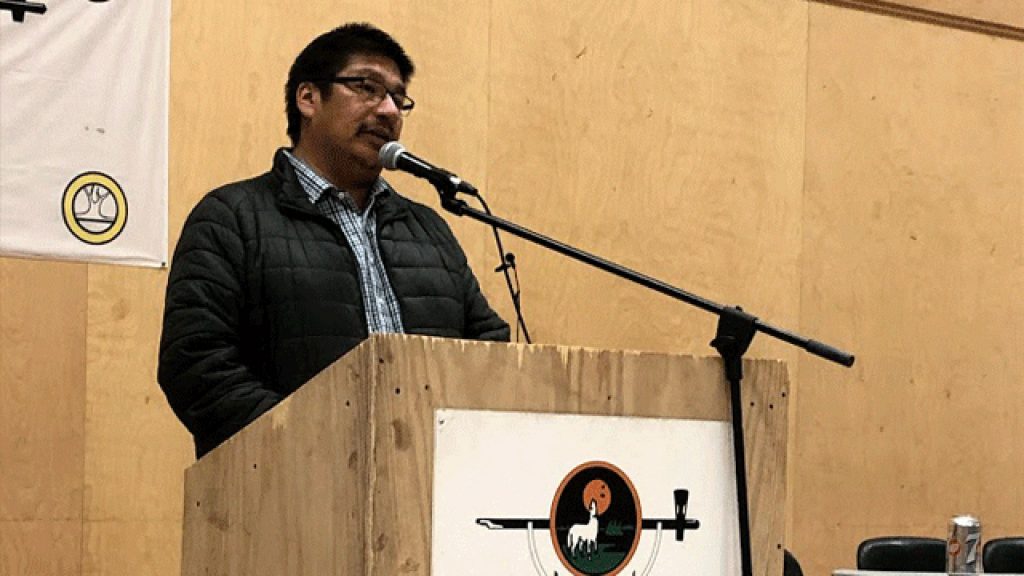
Neskantaga Chief Wayne Moonias speaks in the community in 2019. Photo: APTN/file
As cases of the new Omicron COVID-19 variant continue to skyrocket across Canada, Neskantaga First Nation in Ontario is calling on the provincial and federal governments to provide it with much needed infrastructure and supports to its community.
“It’s very concerning and worrisome right now for the community,” Chief Wayne Moonias tells APTN News. “It could be a very devastating situation for our people, especially our most vulnerable.”
Neskantaga is a fly-in community of around 374 people located 436 kms northeast of Thunder Bay, Ont.
Moonias says the First Nation is struggling with many concerning issues that will only be exasperated if Omicron finds its way into the community.
Neskantaga has been under a boil-water advisory for close to 27 years. The community has also been under a state of emergency since 2013 due to a suicide and mental health crisis.
To make matters worse, housing is in severe short supply, and Moonias estimates some households have as many as six to twelve people living in a two- or three-bedroom house.
There’s only one isolation unit in Neskantaga, and when people need to re-enter the community they often have to self-isolate in a crowded household.
“We don’t have infrastructure or supports in place to effectively deal with a COVID outbreak,” Moonias says.
He notes Neskantaga has been requesting supports from the provincial and federal governments since the beginning of the pandemic. He says the requests have largely gone unanswered.
“We’ve been asking for isolation units that are more permeant and manageable … We’re hoping that can be resolved and supports provided to Neskantaga because we all know COVID is not going to go away any time soon,” Moonias says.
He notes earlier this spring the First Nation grappled with a COVID-19 outbreak, and he’s concerned there could be a repeat of the situation.
“We struggled with the way we respond to that because the infrastructure and supports that we needed to effectively deal with our outbreak back in the spring … the conditions have not changed,” Moonias says.
While there are no active cases in the community, Neskantaga is preparing to protect itself from the highly contagious and quickly spreading variant.
On Dec. 20 the First Nation implemented several restrictions to curb the spread of the new variant. They include limiting travel to and from the community to essential-only, as well as requiring all community service providers to be fully vaccinated with an additional booster shot.
The restrictions are a result of an emergency chiefs’ meeting that was held last week by Sioux Lookout First Nations Health Authority (SLFNHA), which advised measures be put in place to protect Indigenous communities from the Omicron variant.
The recommendations prompted Moonias to write a letter on Dec. 21 to Indigenous Services Minister Patty Hajdu asking for help with securing isolation supports for the community.
The letter states the First Nation needs assistance from the federal ministry with obtaining isolation units, funding for perimeter security and requires support for its food security needs.
“The messages we keep getting from your bureaucracy is that they continue to review the need based on the parameters of its authority. Their message tells us that our safety is not paramount and not a real concern,” the letter states.
It goes on to say, “Your intervention is required to move this forward immediately so we can meet the delivery of the isolation unit on this winter road season. The supplier for the isolation infrastructure requires an urgent answer this week to ensure delivery of isolation units.”
A spokesperson for the First Nation told APTN that as far as they know, the letter has yet to get a response.
Indigenous Services Canada (ISC) was not able to meet APTN’s deadline Friday for comment on the letter.
A previous press response by ISC states that as of December 2021 it has funded 518 mobile structures, identified 130 existing community spaces that can be upgraded, initiated 184 site servicing projects and initiated 97 hotel or space rentals.
But Moonias says he wants to see real action for his community—not words.
“All they’ve been doing is talking, and that’s unacceptable for our community.”
ISC has since offered a response to this story after it was published.
Neskantaga will be receiving two three-bedroom quarantine units through a request by SLFNHA, funded by ISC.
ISC says it has provided more than $4.4 million to support Neskantaga’s response to COVID-19. This includes funding to support the purchase of the two new COVID-19 isolation units and to support off-reserve membership.
ISC is currently reviewing an additional request for funding by Neskantaga and a decision is expected shortly.









